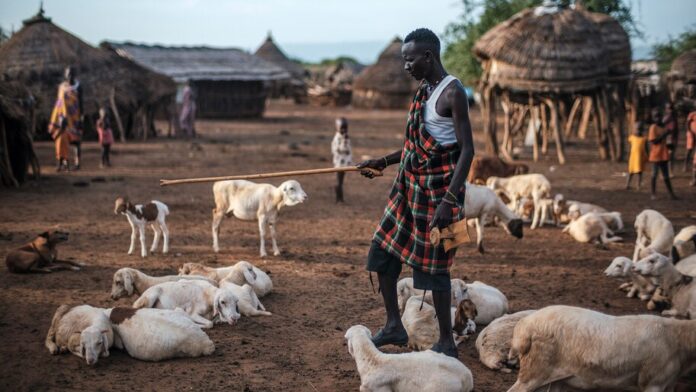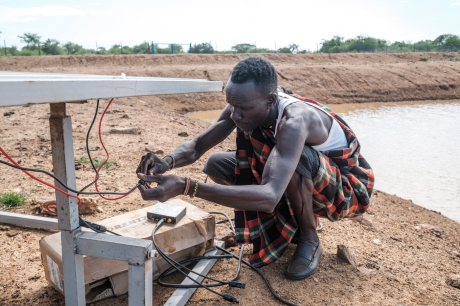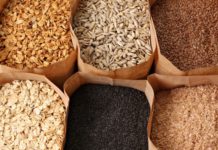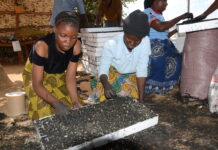
It is early morning, and Michael Lokuru Kuri is taking his cattle out to graze as he does every day when the sun rises, to beat the heat. It’s a peaceful enough scene as he marshals his livestock out of the compound.
It hasn’t always been like that. “I have been raided twice,” Lokuru, as he is known, says. He explains that amid tense relations with neighbouring communities in Kapoeta South County, Eastern Equatoria State in this southeastern part of South Sudan, “They want to take our livestock by force and also try to kill us. All my cattle were taken so that I was only left with five.” He closes his fist to denote the number five and recounts how he had to struggle again to get more animals.
But at least some of the challenges he faces with his cattle have been eased. Earlier, the prolonged dry season had forced him to take his animals far from his village of Nakoringomo for grazing and thus heightened the risk of conflict over water resources. This was before the Food and Agriculture Organization of the United Nations (FAO), with funding from the African Development Bank (AfDB), provided support to excavate a 30 000 m3 reservoir and installed a solar-powered water pump in his community. “Now we don’t need to take our animals to other locations for water because we have enough water for the animals,” the 34-year-old says.
Powered by two solar panels that generate the electricity to pump water sustainably from the reservoir, this installation means that he and his community no longer have to laboriously collect water from a catchment basin. “The solar water pump has simplified everything for us.”
“Our livestock now drink clean water pumped by the solar pump to the troughs,” Lokuru says as he fills one from a hosepipe for the cattle to drink. Having clean water available means that the animals stay healthier, a fundamental concern for people who rely on livestock for their living.
Implemented by FAO on behalf of the AfDB and the Government of South Sudan, the support is part of an initiative to boost the resilience and adaptive capacity of communities in the face of climate change.
Meshack Malo, FAO Representative in South Sudan, says the country’s concerning level of food insecurity is a major challenge. “In this country, we still have over 70 percent of people who, at one time or another, are not sure where they’re going to get their next meal,” states Malo.
Added to that, there is the continuing impact of fighting in large areas of the country and climate change. “And so the country finds itself in this double challenge and sometimes even triple challenge with floods or dry conditions,” Malo concludes.
On Lokuru’s farm, the ravages of climate change are clearly visible in the cracked soil and withered crops on his fields. “There have been changes in the weather,” he says. “This year has been the worst; all crops were destroyed by the sun,” he describes, crumbling the desiccated crop through his fingers. “We have not harvested anything this season.”
So it’s all the more important for his family to keep their livestock healthy. For three-quarters of the community here, “their livelihood is livestock, and they actually depend on livestock,” says Quinto Asaye Alex, Inspector for Veterinary Services Eastern Equatoria, as he prepares to vaccinate Lokuru’s goats.
An even more crucial purpose for the vet’s visits is training Lokuru himself to administer the jabs to his animals and those of his fellow villagers. The FAO-supported training for community workers like Lokuru, who was nominated by his own village, includes administering vaccines, identifying diseases, dividing the sick animals from the healthy ones and treating them, Quinto explains.
Lokuru is one of 30 community workers who have been trained in the whole of Kapoeta South. “I consider myself as a leader because I have the knowledge. FAO has trained me in so many things. I give treatment and vaccinations, something that other people cannot do. I still have the strength. I will train the youths and ensure they become like myself in the community.”
With the help of the initiative run by FAO and its partners, Lokuru’s efforts are helping his community keep their livelihoods going and training young people to do the same amid the challenges faced by their country.







